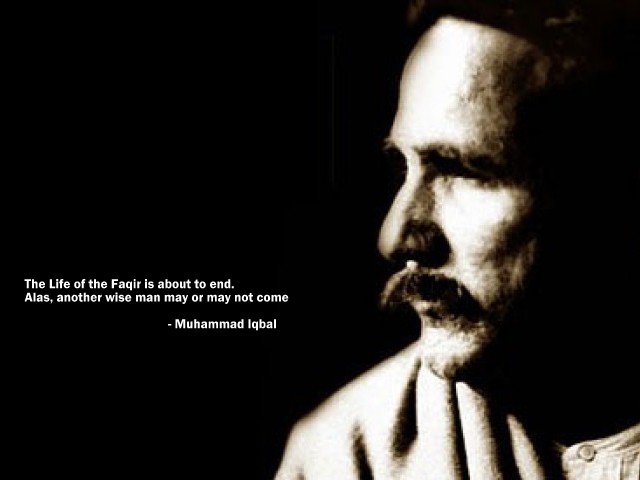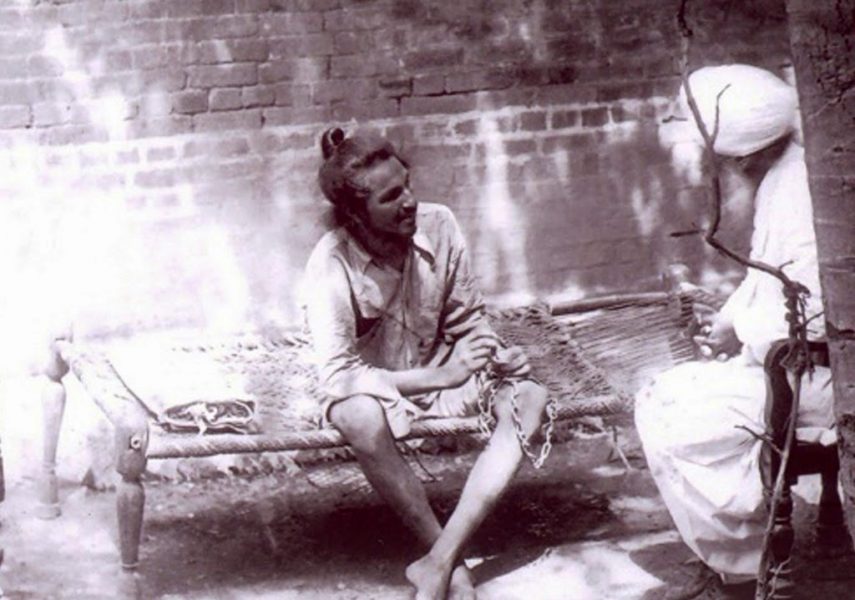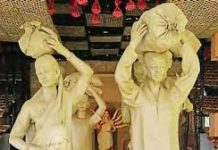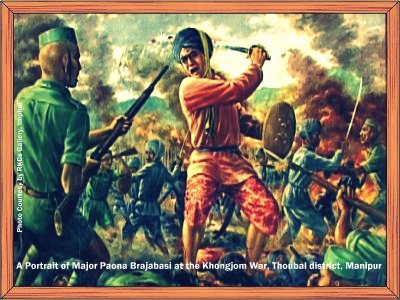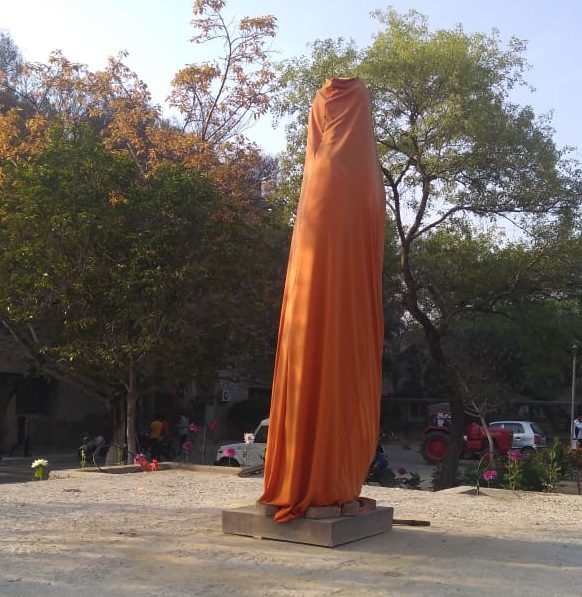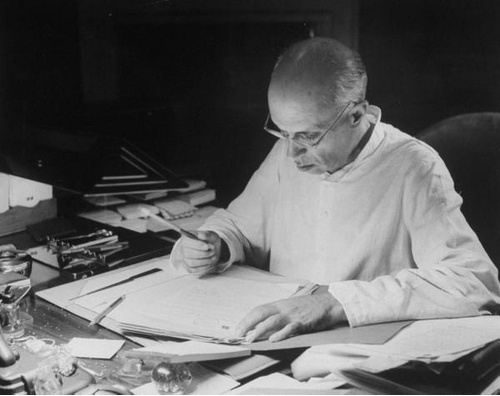SPECIAL ESSAY
At a time when we confront diverse and conflicting views on nation and nationalism, it is important to recall Mohammad Iqbal—the intellectual journey that the poet-philosopher undertook, the way he looked at Islam, religion and modernity, and critiqued the idea of ‘territorial nationalism’.
Dr. Irfanullah Farooqi is serving as an Assistant Professor at the Department of Sociology, Aligarh Muslim University. He is interested in intersections between different disciplines especially sociology, literature and history. Some of the fields that have sustained his interest for some time now are literature, Modern South Asia, religion, sociology of knowledge and sociology of education.
After the French Revolution it was held by many that religion would not remain that crucial in people’s daily life. The revolution was an extremely important part of a much longer chain of events starting with the Protestant Reformation. It was maintained without much contest that the emergence of the age of nationalism would automatically mark the gradual demise of the age of religion. Although religion, in a relative sense, lost its presence in the public sphere, it managed to acquire newer and more apt forms. However, what became more striking for intellectuals in general was that nationalism itself became some sort of a religion of the modern age. So religiosity per se did not bid adieu to the human race.
These days we are urged to once again debate and discuss nationalism. There is a significant section of our country that is completely against any such endeavour for it considers nationalism as of the most sacrosanct aspects of citizenship. This is a section, unfortunately gaining on numbers, that propounds a very restricted understanding of the sentiment wherein exclusion acquires more prominence than inclusion. But then, there is another section that is more than willing to revisit categories such as “nation”, “national”, “nationalist” and “nationalism”. Needless to say, a lot has been said from both the camps and allegiances have got further strengthened. While there is no denying that an informed engagement with this exchange of words will add meaningfully to our overall understanding of the sentiment, in this article, I am more interested in engaging with the sentiment’s formative years in the subcontinent. It is in this regard that in the following passages I reflect on Muhammad Iqbal’s idea of nationalism.
Muhammad Iqbal (1877-1938) remains one of the most significant Muslim figures in the modern world. Iqbal’s life and thought remain exceedingly crucial in the context of understanding the ways in which nationalism as a political ideal was understood in 20th century colonial India. Given the period he both belonged and responded to, he becomes indispensable for anyone interested in engaging with questions related to religion, identity and politics. More importantly, given what all happened in the subcontinent within ten years of Iqbal’s death, his thought acquired all the more significance.
While a certain political consciousness emerged by the end of the 18th century (when the British ceased to exist simply as outsiders interested in trade and commerce), it was particularly the failure of the mutiny that led to the emergence of a national consciousness. It was around this time that people started associating themselves with the idea of India as a nation. Some of the identity markers that had remained exceedingly crucial till the mutiny lost their appeal in the wake of the emergence of the “national”. However, within few years, for a variety of reasons, an unholy alliance got developed between religion and nationalism as a result of which, with reference to Hindu-Muslim equation in the subcontinent, the idea of the cultural “other” came to the fore. As an intellectual pursuit, framing of the “past” played quite a catalytic role in this rigidifying and othering of identities for, within the context of the history of Indian civilisation, it defined the insider and the outsider or, even worse, invader. By the time Iqbal started making sense of the situation within which he was located (the end of the 19th century), Hindus and Muslims had at least become aware of the idea that they belonged to two different communities that had separate histories and different cultures. While these communities were most definitely not at each other’s throats at that point, what cannot be denied at the same time is that there was not that much cordiality either.
During his initial years, both as a student of literature and a poet, Iqbal demonstrated remarkable affection and love towards his nation. There are several compositions of his written before he left for Europe in 1905 that clearly inform us of his nationalist sentiment. Who can deny Saare Jahan Se Acha Hindostaa Hamaara its due in terms of its nationalistic credentials? In fact, this composition remained the benchmark of Indian nationalism for quite some time before the National Anthem came to the fore. It is an absolutely comprehensive account of the promise of India in terms of its geography, history and culture. More importantly, Iqbal penned this composition at a time when both Hindu and Muslim nationalism had become full-fledged realities. While the former started with the demand for Devnagri script in the 1860s the latter came into being with the spread of modern education within a certain section of Muslims of North India.
When Iqbal was studying at Government College, Lahore, colonial India had its ruptures well in place. Identities had acquired specific meanings and histories. Yet, Iqbal’s nationalism remained indifferent. Till then nationalism was premised on the idea of othering–Muslim, Hindu or the British–a particular group. Iqbal remained pleasingly distant from that policy or politics. As a poet deeply committed to the essentials of poetic universalism, Iqbal evolved a new grammar of nationalism. His sentiment did not target the British as the outsider or the other. Instead, it was found premised on an unusually refreshing engagement with the landscape of the country, it’s incredibly rich history and its remarkably accommodative character. His famous composition Himalaya is a wonderful example of the way his poetic universalism fuses with his patriotic fervour.
In the year 1905 Iqbal left for Europe for higher studies. He first went to London and from there he went to Germany where he completed his doctorate at Munich. By the time he returned in 1908 having spent three years in Europe he had three degrees with him. Needless to say, his stay in Europe was anything but relaxed. However, what needs to be categorically highlighted is that this was also the period when Iqbal got acquainted with the larger political landscape. Through his extensive reading, interaction, and meticulous observation of various events he got introduced to the condition of Islam and Muslims in the face of changing landscapes. This made him comprehend the challenge before Islam in its entirety. It is in this regard that he developed an exceedingly informed criticism of territorial nationalism as propounded by Europe, an idea that, in Iqbal’s opinion, posed severe threat to the future of the global Muslim community.
While in India Iqbal’s understanding of nationalism was not that extensive. He did not find anything contradictory between Islam and nationalism. Especially his poetics found an interesting synthesis between the two. However, during his stay in Europe, when he became aware of territorial nationalism he sensed the danger it posed to Islam and global Muslim community. We are informed by Iqbal’s son Javed Iqbal that within year and a half of his stay in Europe Iqbal became aware of the dark aspects of territorial nationalism. This implies that by the beginning of 1907 Iqbal had started questioning the sanctity of nationalism (one promoted by Europe) and started moving towards the transnational Muslim community[1].
According to Javed Iqbal, the biggest revolution with respect to Iqbal’s stay in Europe was his distancing from nationalism and his faithful leanings to Islamic teachings. Consequently, the Iqbal that returned from Europe was not similar to the one who left for Europe. With a changed political vision upon his return, Iqbal got himself closer to the Muslim modernists. Pondering over Muslims’ share in the political power, their economic grounding, leadership, worldly life and so on, Iqbal found Indian nationalism lacking on all these fronts. Indian nationalism, in his opinion, could not provide Indian Muslims the essentials by virtue of which they could find themselves safe and rooted. This remained Iqbal‘s major concern throughout his political and intellectual career.
Given the role of Europe in introducing the concept of territorial nationalism, for Iqbal it was impossible to forgive Europe. He made a clarification that contrary to the stupid perception of few people who thought science was Islam‘s enemy (he believed Islam‘s position against science was extremely strong and deep rooted), it was Europe‘s idea of territorial nationalism that was Islam‘s severest enemy. In response to this political ideal Iqbal made a case for Pan-Islamism, an idea championed by the renowned Muslim reformist Jamaluddin Afghani (1838-1897). While Afghani advocated Pan-Islamism as a means of resisting colonial occupation of Muslim lands, Iqbal perceived it as a strong antithesis to territorial nationalism[2]. In his extremely well-known Persian work Javid-Nama, Iqbal has to say the following through Afghani:
It is a world lost now in our breast,
a world awaiting yet the command – Arise!
A world without distinction of race and colour,
its evening is brighter than Europe’s dawn;
world cleansed of monarchs and of slaves,
a world unbounded, like the believer’s heart,
…Eternal it is, the impact of it ever new,
ever new the leaf and fruit of its sure foundations;
inwardly it is anxious not of change,
outwardly, every moment is revolution.
Behold, that world lies within your own heart
now I will tell you of its firm foundations.
There is hardly any need to mention here that this composition speaks of Afghani’s lifelong quest for a united world, a quest that found an ardent admirer in Iqbal. In many of Iqbal’s letters too there is an unambiguous reference to his aversion towards territorial nationalism. In a letter written to Waheed Ahmad Masood Badayuni on September 7, 1921, he writes:
“At this point the severest enemy of Islam and the Muslim world is racism and the idea of territorial nationalism. It has been 15 years when I first analysed it. At that point I was in Europe and this feeling had brought about a remarkable revolution in my thoughts. The fact remains that Europe‘s atmosphere made me a Muslim…I do not know whether my writings have influenced other people or not but what remains certain is that this thought has majorly affected my life.” (Kulliyat Makaateeb-e-Iqbal, Volume II, 2010: 271)
What is interesting about this letter is that there is a footnote by the editor which says that Iqbal had earlier written 13 years and then corrected it to 15 years. This implies that initially Iqbal was to mean that he first analysed nationalism in 1908 i.e. the year he left Europe or was to leave Europe but then he corrected it to 15 implying that he had started his analysis of nationalism as soon as he went to Europe.
Territorial nationalism, according to Iqbal, was in complete opposition to Islam‘s universalistic message. In another letter of his written to Syed Muhammad Saeduddin Jafri written on November 14, 1923, Iqbal reflects at length on the promise of Islam and need for pan-Islamism. He asserts:
“According to me, Islam is a practical means of taking the human race above geographical boundaries and racial and nationalistic differences… because at this point the wave of national and racial differences is about to enter Asia from Europe and for me it is a major curse for the human being…There is a need to publicise the essential Islamic facts with reference to the betterment and prosperity of the entire human race and not just Muslims. This is why I always keep before myself a strictly Islamic perspective. In the beginning I too had faith in nationalism and perhaps I was the first one to dream composite nationalism in India but widening of experience and thoughts has brought about change in my thinking…You consider Pan-Islam to be political or national movement. According to me it is a means of bringing few human nations on one platform. That ways these nations will be free from racial, national and territorial differences. Thus Islam is a step towards unity of the human race. This is a social system that rests on the pillars of equality and fraternity. Thus, whatever I write with reference to Islam has to do with service towards human race and nothing else. And according to me, from a practical point of view, only Islam can be means for achieving humanitarian ideal. Rest of the means are all philosophies which look very appealing but are not apt for action.” (Kulliyat Makaateeb-e-Iqbal, Volume II, 2010: 493-95)
Iqbal was convinced that there was no scope for nationalism in a politics that was righteous. The text of the letter is self-explanatory. Iqbal cannot be clearer than this regarding the role of Islam in bringing about the moral revolution and achieving the humanitarian ideal. But, in the name of territorial nationalism, Europe was propagating a philosophy which was absolutely inappropriate to act upon at a time when the human race required freedom from markers of distinction. This is why Islam and nationalism remained one of the major areas of intellectual engagement for Iqbal.
In the last years of his life Iqbal had a serious debate with Maulana Husain Ahmad Madani, head of Darul Uloom at Deoband and a renowned nationalist Muslim. The debate primarily centred on the question of nationalism with reference to Muslims. Madani, an ardent proponent of composite nationalism, insisted that a religiously pluralist society would serve the interests of Muslims in every possible manner. In December 1937, in a political meeting, he categorically stated that in the 20th century nations were made out of territory and not religion. Speaking in favour of the desired political autonomy for religious communities, in his piece titled Islam and Nationalism, Iqbal rejected this thesis by arguing how boundaries changed with time. Iqbal insisted that in the 20th century the term “nation” did not only imply the geographical but also political and it is the latter with which Islam, as a law of human society, comes into severe conflict. Iqbal was so staunch in his criticism that he accused Madani of “singing heresy from the pulpit”.
Being a poet more than a philosopher, in the case of Iqbal, the felt overwhelmed the observed. Throughout his life he was chasing certain ideals. His poetic sensibilities did not let him appreciate territorial or competitive nationalism one bit for he could see their drawbacks and comprehend the much severer threats in store in subscribing to those political concepts. Iqbal was aware of how modern nationalism’s peak point was war, a reality Tagore reflected on at length in his writings on nationalism.
There is a poem composed by Iqbal titled Wataniyat (Patriotism) wherein right after the title Iqbal has clarified that patriotism in that composition is looked at as a political concept. In that poem he writes:
Country, is the biggest among these new gods!
What is its shirt is the shroud of Deen (Religion).
This idol which is the product of the new civilization
Is the plunderer of the structure of the Holy Prophet’s Religion.
The limitation to country results in destruction
Live like the fish in the ocean free from country.
In political parlance country is something different
In Prophet’s command country is something different
The antagonism among world’s nations is created by this alone;
Subjugation as the goal of commerce is created by this alone;
Politics have become bereft of sincerity is by this alone;
The destruction of the home of the weak is by this alone.
God’s creation is unjustly divided among nations by it
The Islamic concept of nationality is uprooted by it.
Iqbal’s religious fervour made him believe in another possibility in relation to bringing people together. That said, his religiosity is not to be understood in a conventional dichotomous fashion. It was about an informed comprehension of the limitations of the “worldly”. Nationalism as a political ideal could not enchant Iqbal for he knew it could not last that long. He could not believe in nationalism’s potential in relation to peace, security and harmony. Given the temperament of modern nationalism Iqbal knew very well that it was altogether impossible to have a non-religious pluralist state based on one nation. Rather than talking about moral reformation of the individual alone, in the light of basic teachings of Islam, he advocated some sort of a fundamental revolution in the social life which should facilitate the creation of a purely human consciousness. Nationalism failed miserably in that respect.
There is no point debating the merits of Iqbal’s arguments in the context of nationalism. The poet-philosopher shared his vision as forcefully as he could and left the scene. Now we are left with the present state of affairs in the subcontinent to make sense of his observations and prophecies. Pluralism in India is in bad shape. Indianism of a peculiar, rigid, and ahistorical kind is imposed on every mortal that inhabits the Indian territory without paying scant attention to the idea of diversity, plurality and multiplicity of traditions and practices. There is a full-fledged argument wherein minorities (especially Muslims) are expected to lose themselves in the majority. Muslims as part of Indian nation are asked again and again to forsake their communal ethos. And all of this is carried out in the name of nationalism, one that is disturbingly emotional and uncommonly rigid. Iqbal warned us of all this way back. He warned us of a politics that was devoid of understanding unity in the most overarching sense. He urged us to remain conscious of the dark side of modernity; one that was all about consumerism, racism, competitive nationalism and imperialism. Human beings after all, as he held throughout his intellectual and poetic career, were meant to follow much higher ideals than the likes of territorial nationalism.
NOTES
[1] According to Iqbal’s biographers in general, the shift from nationalism to global Muslim community is also held responsible for Iqbal‘s initiation into Persian compositions. Although well versed with the language and literature right from his early days, Iqbal never composed in Persian. It was in Europe that he started composing in Persian. Given that Persian was the lingua franca of the erstwhile Muslim world, it is maintained that his choice of the language was essentially linked to his new frame of intellectual and poetic commitment. Therefore, the shift from nationalism to global Muslim community also marked the beginning of a new phase in his poetic career.
[2] What is interesting to note in this regard is that while Afghani advocated for Pan-Islamism in general during his stay in India he made a case for Hindu-Muslim unity in response to colonialism and even advocated nationalism of a linguistic or territorial variety.
The New Leam has no external source of funding. For retaining its uniqueness, its high quality, its distinctive philosophy we wish to reduce the degree of dependence on corporate funding. We believe that if individuals like you come forward and SUPPORT THIS ENDEAVOR can make the magazine self-reliant in a very innovative way.
This article is published in The New Leam, JULY Issue( Vol.2 No.13) and available in print version.

